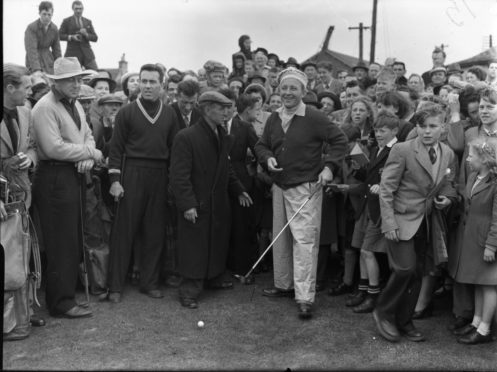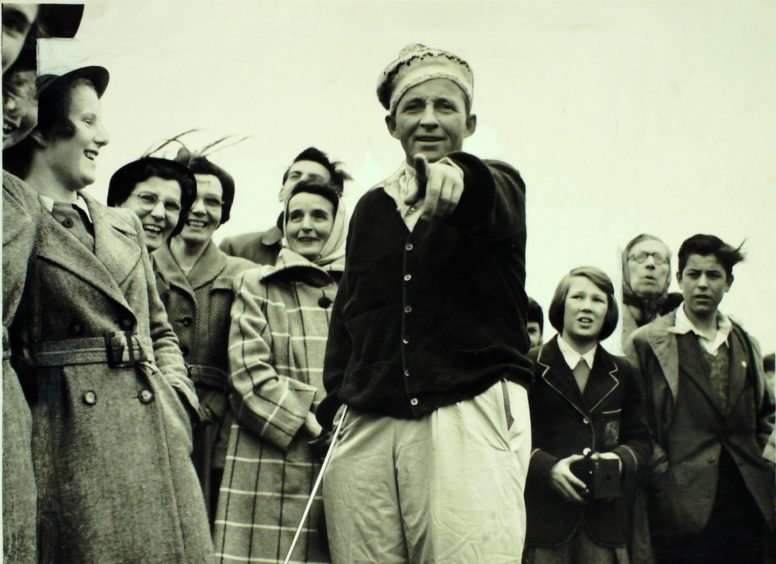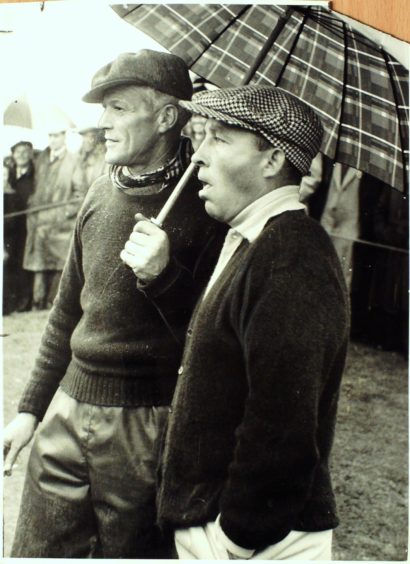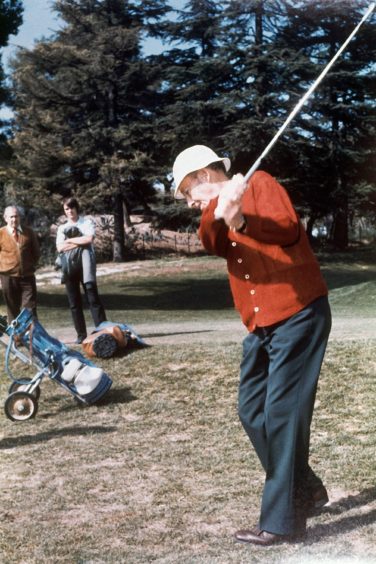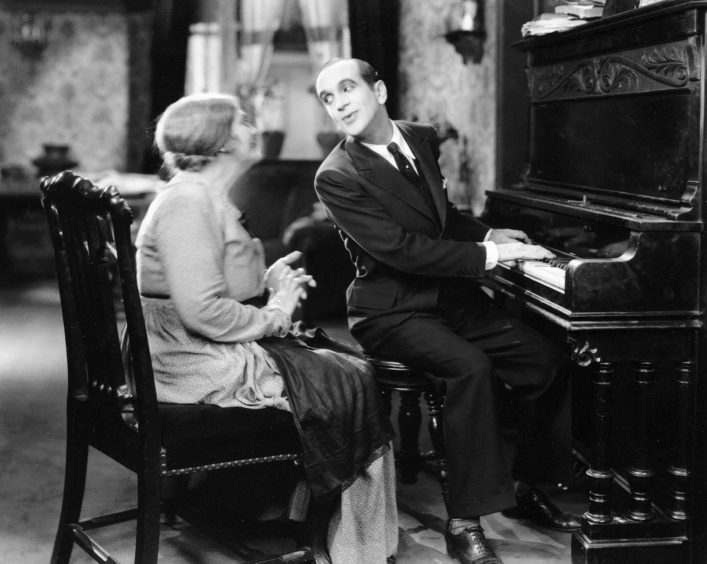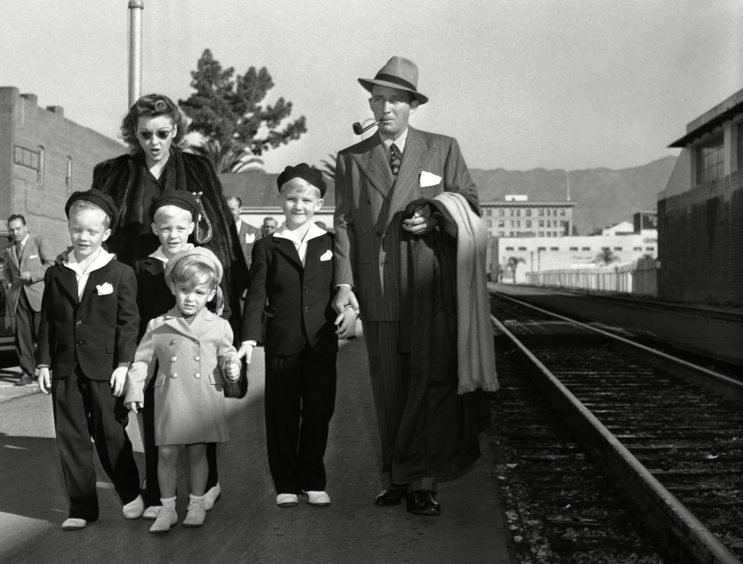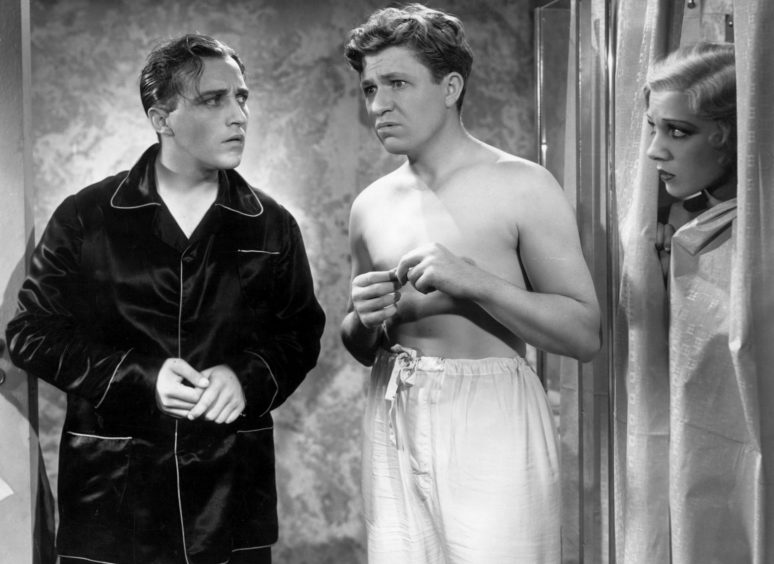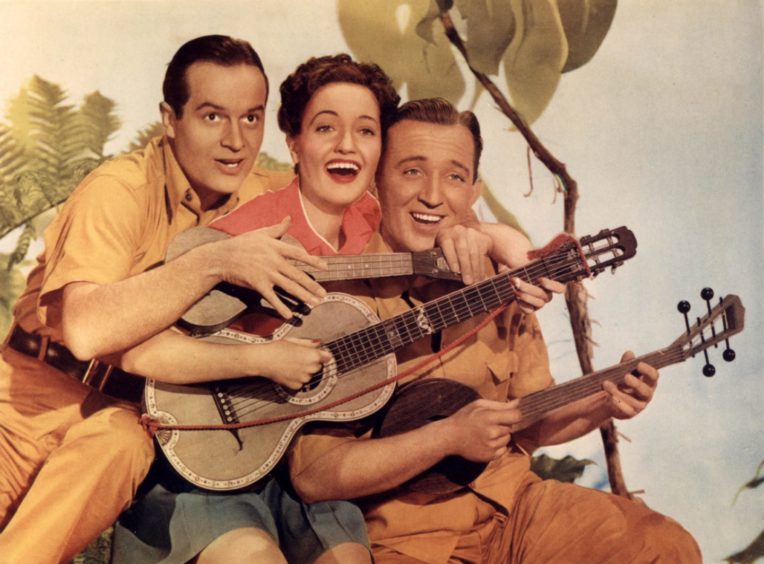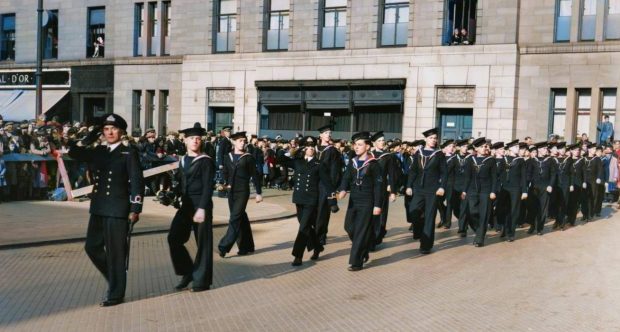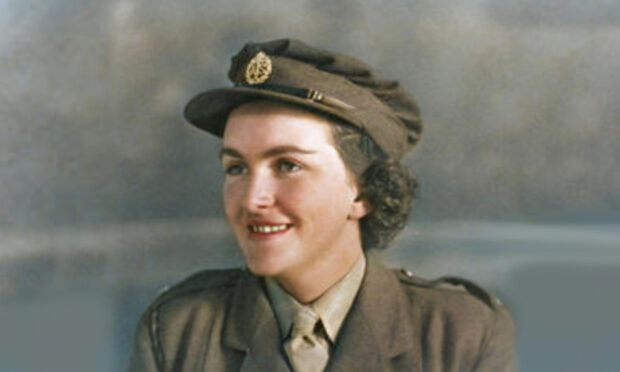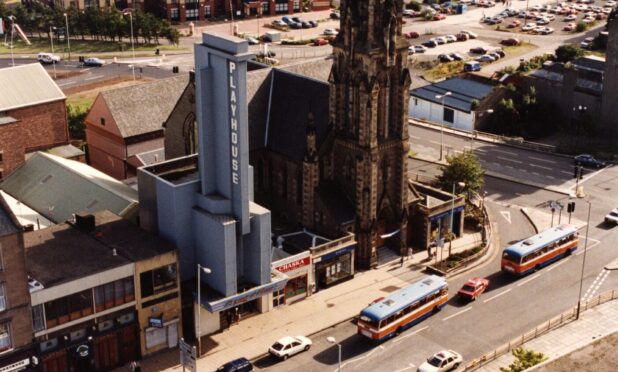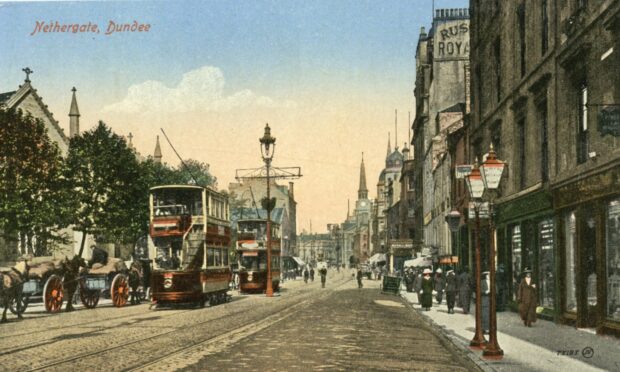It was the day America’s favourite crooner wowed the crowds at the home of golf and needed a police escort to escape.
Bing Crosby played in the British Amateur Golf Tournament on May 21 1950 under his real name, Harry.
The matchplay clash with local builder James Wilson and the world-famous singer and actor at St Andrews resulted in a media avalanche.
Amateur crooner
At least a thousand fans waited for hours in the rain and extreme cold of a north-east wind to catch a glimpse of Crosby and watch his game.
Crosby started well and was three up in the first three holes before Wilson came back to level at the seventh and they made the turn all-square after nine.
Dressed in a maroon pullover, yellow jumper and check cap with a pipe in his mouth, Crosby became increasingly casual with his shots and started to fall behind.
Crosby lost his first round match three and two to Wilson, who was described in the press as an ‘amateur crooner’ who ‘frequently vocalises at amateur theatricals’.
He had a half-a-crown bet on the match with Wilson and tried to slip back to his hotel quietly but was surrounded by a solid mass of children, girls and women.
The police came to the rescue by proving a car escort and Crosby was driven away amid cheers from his admirers who had waited three hours in the rain.
Film crews were on hand to record the event for newsreels, while newspaper reports emphasised the excitement generated by Crosby’s appearance and one headline read: ‘Golfer Crosby greeted at Scottish Links by One Man and 2,000 giggling Lassies’.
Crosby’s experience in the Amateur Championship encouraged his movie sparring partner Bob Hope to qualify for the event in 1951 at Porthcawl in Wales but he suffered a first round defeat.
Keen golfer all his life
In 1951 Crosby was elected a member of the Royal and Ancient and he would go on to set up a new tournament for senior golfers with his Fife friend James Wilson.
The two men, who had remained in contact, played together again on the Old Course in September 1972 for the Bing Crosby Trophy which was a competition for club members over the age of 60.
The tournament continues to this day and in 1995 was won by Sean Connery.
Crosby was a keen golfer all his life and played in Scotland whenever he could.
In September 1966 the singer took part in a golf tournament at Gleneagles which was inaugurated by General Eisenhower.
He had arrived from Ireland where he had played in the first match of three between Scottish, English, Irish and American golfers at Portmarnock.
In August 1971, Crosby spent a week’s golfing at Troon and at Gleneagles and was promptly besieged by autograph hunters after arriving at Prestwick Airport from New York.
In 1975 Crosby swapped putts for pints when he famously appeared in a Tennent’s lager TV advert which was filmed at the Black Bull Inn at Straiton, Ayrshire.
He was in Scotland to take part in the Pineapple Pro Cel-Am for Cancer Relief on the Ailsa Course at Turnberry where he partnered Ryder Cup golfer Bernard Gallacher,
The following day he played golf with Ryder Cup player Christy O’Connor and jockey Geoff Lewis at Dalmahoay, Edinburgh, in a pro-am organised by comedian Jimmy Tarbuck.
A crowd of 12,000 watched the golf and at the end of his round Crosby would sing, “A Lovely Day at Dalmahoay”, to the large audience assembled outside the clubhouse.
Carnoustie return
Crosby remained in Scotland to attend The Open at Carnoustie with his sons which was eventually won by American Tom Watson following a play-off against Australia’s Jack Newton.
The following day he was in London for the recording of the ‘A Couple of Song and Dance Men’ album with Fred Astaire, Pete Moore and his Orchestra, and the Johnny Evans Singers at the Music Centre, Wembley.
Sports writer Ian Archer once interviewed Crosby at Gleneagles for STV where Crosby told him: “I love golf. If I ever die on a golf course, at least I’ll die a happy man.”
Crosby died in 1977 shortly after completing 18 holes at La Moraleja golf course near Madrid.
In 1978, journalist Alistair Cooke said of Crosby upon his posthumous receipt of the US Golf Association’s Bob Jones Award for distinguished sportsmanship in golf: “He was everybody’s easygoing buddy.”
Cooke added of Crosby and co-recipient Bob Hope, “We are honouring two men… who have given more devotion, time, enthusiasm and money to the game than any other twosome in the history of show business.”
Crosby passed his love of golf on to his youngest son, Nathaniel, who won the 1981 US Amateur at The Olympic Club in San Francisco, California.
Life and times of a superstar
Crosby was born Harry Lillis Crosby Jr in 1903 in Tacoma, Washington.
He studied law but was more interested in singing and became famous as both a singer and as an actor.
The fourth of seven children, Crosby once claimed that he got the nickname because as a toddler he would shoot passers-by with two wooden revolvers, yelling “Bing!” as he did.
It was only later that a neighbour corrected this version.
Nickname shortened to Bing
Valentine Hobart insisting that he got the name from her nickname for him, Bingo From Bingville, after a comic in a local paper, The Bingville Bugle.
Harry, she said, looked just like him, and the nickname was soon shortened to just Bing.
He lived to the age of 74, had two wives, seven kids, and a triple career as a comic, actor and singer.
As well as being a very handy golfer, and racehorse breeder, he helped develop video recorders and studios’ recording process and was the first man to pre-record radio shows and save them on magnetic tape.
Crosby was still young when he witnessed the act who would inspire him and propel him towards a life in showbusiness.
Aged 14, he had a summer job at a local auditorium that hosted some of 1917’s biggest stars, and he was overwhelmed by Al Jolson, who did parodies of Hawaiian songs to everyone’s amusement and effortlessly made up his show as he went along.
He would call the performance “electric” and helped by developments in technology, he would develop the crooning style that everyone would soon recognise, getting up real close to the microphone and half-talking, half-singing.
Making it big in California
He graduated from school in 1920 and, though he attended university for a few years, he didn’t get a degree, although he was impressive on the baseball team.
He was still just into his 20s when he and friends headed to California to try and make it big.
Although he made good contacts, his first recording was done at the wrong speed, meaning his voice was too high-pitched when played at 78rpm.
New York beckoned next, and Crosby got to perform alongside some huge names, like Tommy and Jimmy Dorsey, Bix Beiderbecke and Hoagy Carmichael.
Being in the same halls and studios as those men rubbed off, and he was soon doing well as a solo star himself.
Ol’ Man River in 1928 gave him his first number 1 hit.
At the time, he was part of a band called the Rhythm Boys, but his solo spots stole the show.
He got a solo recording deal, leading the group to part ways.
Triumph and tragedy
One person he was keen to get together with, though, was Dixie Lee, who became his first wife in September 1930.
A nightclub singer and actress, Dixie would die of ovarian cancer in 1952.
The couple had four sons together, Gary, Lindsay and twins Dennis and Phillip.
Gary, too, lost his life to cancer aged just 62, while Phillip died of a heart attack in 2004.
Tragically, Lindsay and Dennis both shot themselves dead, aged 51 and 56.
His marriage to Dixie, however, was a happy one, and he seemed to have thrown himself into his work even more thoroughly than usual.
In early September of 1931, Crosby made his nationwide radio solo debut and ended the year by signing with Brunswick and CBS Radio.
Songs such as Out Of Nowhere and At Your Command were among the year’s best sellers, and of the Top 50 songs of 1931, Crosby featured on 10, solo or part of a band.
Paramount contract
He spent part of the following year doing his first full-length film, The Big Broadcast, one of almost 80 movies he’d make.
It did so well that he got his first contract with Paramount.
His weekly radio shows and earlier commercials also happened at this busy time, making it clear how quickly he became a household name.
In the Depression, with record sales dipping as nobody had money for such luxuries, Bing Crosby’s records were the exception to the rule, selling like hotcakes despite that.
Steve Hoffman, an audio engineer, said: “Bing actually saved the record business in 1934, when he agreed to support Decca founder Jack Kapp’s crazy idea of lowering the price of singles from a dollar to 35 cents!”
Louis Armstrong, one man Crosby admired deeply, became his pal almost as soon as they first met.
Their friendship had Crosby fighting to have Armstrong in a movie with him, against studio bosses’ wishes, paving the way for other African Americans to also get film parts.
Critical acclaim
He also made sure Armstrong would receive the same prominent billing as the film’s white stars and Armstrong would often speak of Bing’s progressive attitude towards race.
Crosby’s earliest movies did well, but very few had the critics lavishing him with praise.
So Sing You Sinners, from 1938, would have been a welcome change of pace, as critics seemed to recognise that he was coming out of his comfort zone and trying new roles.
The story of three singing brothers who head for California seeking fame and fortune, must have struck a chord with his own story.
The film also introduced Small Fry and I’ve Got A Pocketful Of Dreams, both of which would become Crosby hits, the former done as a duet with the great Johnny Mercer.
As if he wasn’t a big enough star by 1940, Crosby chose that year to launch himself on a series of movies that would send him into the stratosphere.
The Road To series, seven films in all, would play a huge part in Crosby’s success, making him the biggest star in the world, both through and after the Second World War.
He starred in the comedies alongside Bob Hope and Dorothy Lamour, which were so popular that even the threesome were taken aback at how well the first one did.
Crosby’s career was one of the most successful in the history of show business. He made 58 motion pictures, broadcast an untold number of radio shows and sold more than 300 million records.
There were no last words
He collapsed while walking to the locker room at the La Moraleja golf club after completing an 18-hole round.
He and a Spanish champion had defeated two other Spanish champions by one stroke.
He was stricken as he and the other members of the foursome — Manuel Pinero, Valentin Barrios and Cesar de Zulueta — were walking toward the clubhouse. Crosby and Pinero had been matched against Barrios and De Zulueta.
Barrios said Crosby did not utter a sound as he fell.
“There were no last words,” the Spaniard said.
